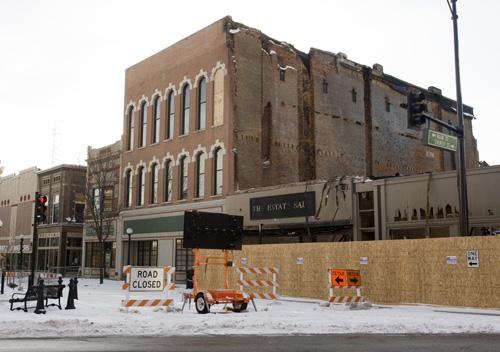Roadblocks prove to be an obstacle for businesses in downtown Champaign

A part of Neil Street remains closed after a building caught fire and burnt down a couple of months ago, causing the city to create a detour around the wreckage. Erica Magda
January 26, 2009
While local business owners in downtown Champaign are already facing a recession, cold weather and students that are just getting back in town from a long break – they are also facing one more obstacle to making a profit – actual physical barriers.
On Nov. 7, a fire severely damaged the Metropolitan Building, 215 N. Neil St. The streets on either side of the building, Neil and Main, were blocked off because of the risk of a collapse.
The roadblocks have now been in place for almost three months and have taken their toll on businesses in the area, said Garry Bowman, building safety supervisor for the city of Champaign.
“We’re doing about a third of the business that we usually do,” said Amanda Oppenheim, assistant manager of Pekara Bakery, 116 N. Neil St. “We also used to be open until nine each evening, and now, we are closing at three.”
Craig Rost, Champaign’s deputy city manager for development, said there is definitely a connection between the roadblocks and the struggles of businesses.
Get The Daily Illini in your inbox!
“We don’t know if it is just the closing off of the street or if it was also the students being gone, the bad economy and the weather,” Rost said. “Businesses have said that they have seen a reduction in traffic but there is by no means an apparent relationship.”
Oppenheim said that Pekara had been suffering through the bad economy but was able to manage before the roadblocks were set up.
Once the building is demolished, there will be no risk of it collapsing onto the streets, and the roadblocks can be removed, Bowman said.
The Metropolitan Building was not the only building damaged in the fire. About 15 insurance companies represent all the businesses that were affected. Guy Hall, a lawyer for Dobbins, Fraker, Tennant, Joy & Perlstein, and co-owner of the building, said that demolition has been delayed because of disputed insurance claims between these various companies and the owners.
“It’s sort of a spider web of things going on,” Hall said. “It’s hard to know what the potential damages of the fire are. Maybe only a few can be reimbursed but these disputes still have to be settled. Everybody has a different coverage.”
Rost said that the city petitioned and has been allowed to start demolition and reopen the street. Last week minor demolition was done for a cause and effect study to determine the origins of the fire. Major demolition is slated to begin Monday and continue throughout the week.
Hall said that he and the other owners have no plans for the property after the demolition at this point.
“To be honest we don’t know what to do yet,” Hall said. “Right now, we are trying to work on the situation at hand, which is getting the building demolished.”
Bowman said the location is a prime site for development and will probably not remain empty for long, but he is uncertain because of the recession.
Until demolition occurs and the roadblocks come down, Pekara is dealing with the reduction in total sales by making retention of employees a priority.
“Although we’ve reduced everybody’s hours we’ve tried very hard to preserve everybody’s job,” Oppenheim said.






